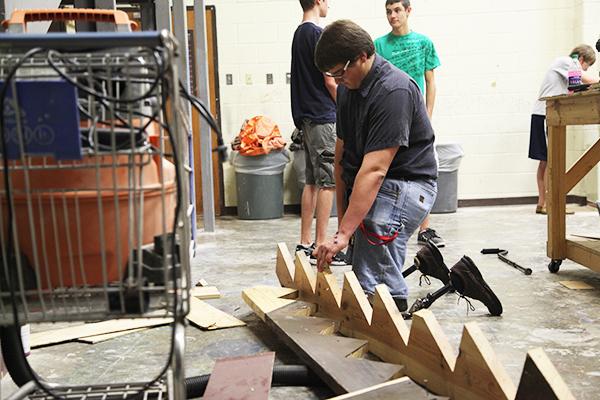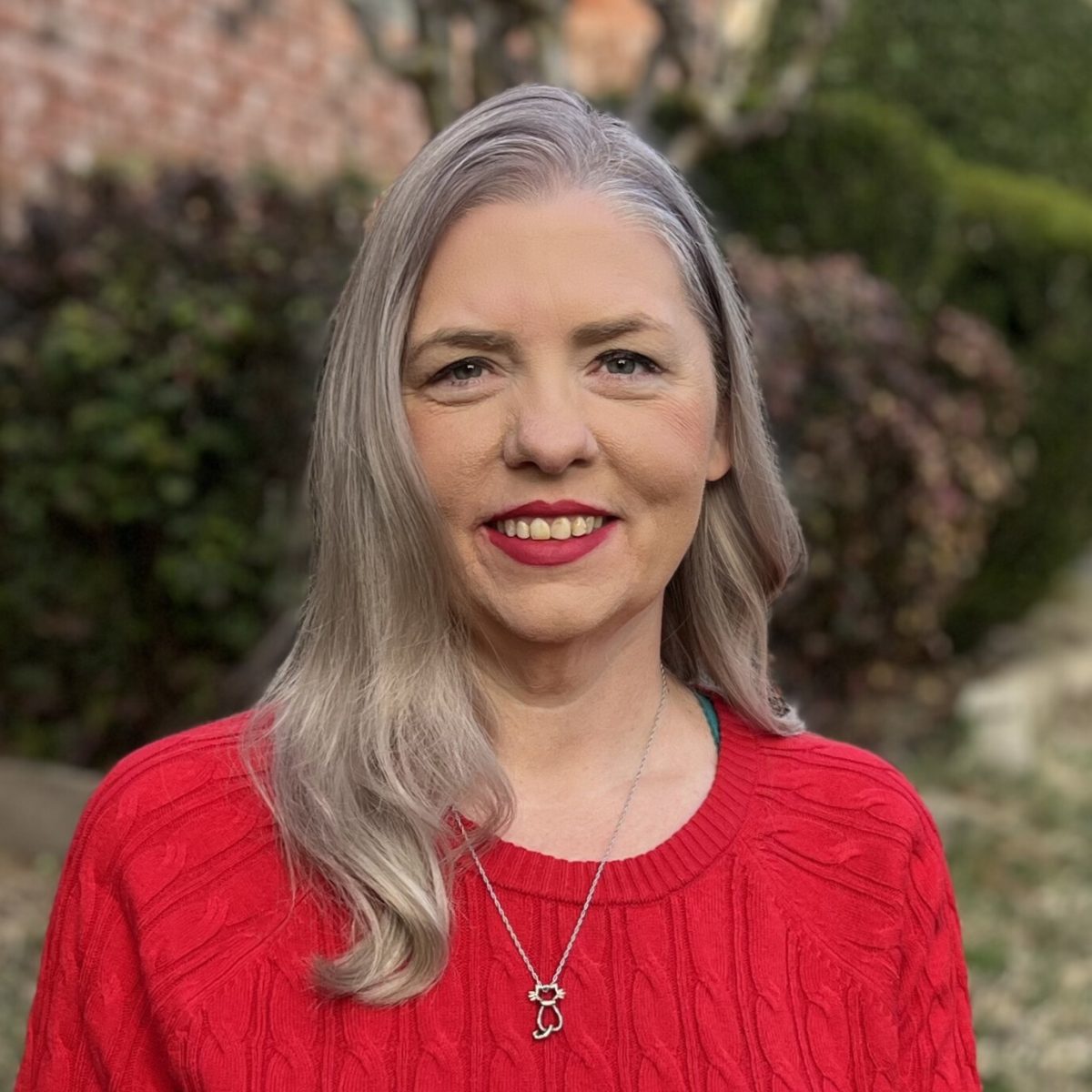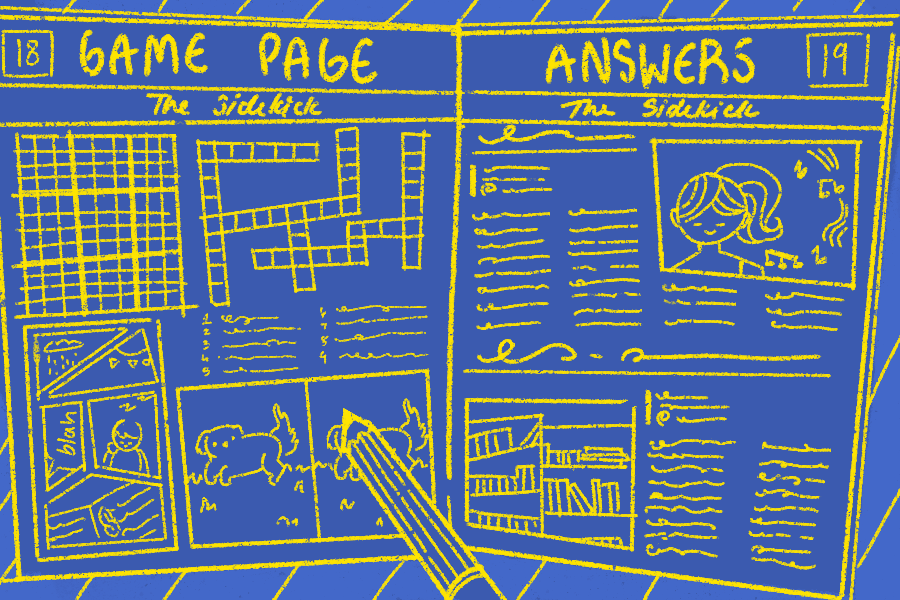By Kimberly Del Angel
Entertainment Editor
Students and parents are driving to school, when they see a young man riding his bike alongside the road. Beads of sweat trace his hairline as he stares into the distance; a normal scene for a Monday morning—until they take a closer look and notice the prosthetic legs, working in mechanical unison to move the wheelchair adaptation of a bike.
Senior Hollis Muenster was born with a condition called Proximal Femoral Focal Deficiency (PFFD), a rare non-hereditary birth defect that affects the pelvis, hip bone and proximal femur, resulting in the disproportion or absence of legs. Muenster has adapted to new methods of mobility to assist his needs and live his life as normally as possible with the help of different prosthetics and mobility aids. He has even developed a technique of sliding down the stairs around campus to speed up the otherwise straining task.
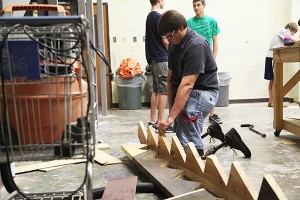
“I have two main prosthetics; the shorter one helps me move a lot more easily, so I can easily jump around, and it basically just makes me even so I can walk around short distances,” Muenster said. “The long prosthetic is worn at school and adds an extra foot of height, making it easier to take longer strides and walk longer distances; it’s also nice on a social stance level. As for sliding down the stairs, I do it because it is faster. It looks cool, sure. I am pulling myself up and swinging my legs over the top of the stairs.”
Contrary to popular belief, Muenster does not believe he has overcome a grand obstacle in his life and is baffled when strangers approach him to express admiration of his condition.
“People come up to me out of the blue and tell me about how inspiring I am, and I have to sit there and smile and say ‘thanks, I’m so happy you feel this way’, but I’ve never really looked at it as a disability because I’ve lived with it my entire life and I don’t have any other perspective on the matter,” Muenster said. “As far as I’m concerned, I’m normal and the rest of you are weird.”
His mother believes in situations where a child is born with a condition such as this, it is a bigger struggle for parents who slip into a slump when failed expectations come into order.
“Most of the time the parents are always in the middle having that massive life change where you think you’re having one thing, you think your child is going to come out normal with no issues or problems, and everything gets flipped upside down the day your kid is born,” mother Chandra Muenster said. “So there is the death of your expectations and a sense of mourning and loss, like something was taken away, but you have something else to focus on and think about and there are all sorts of blessings and things that have come from him being the way he is.”
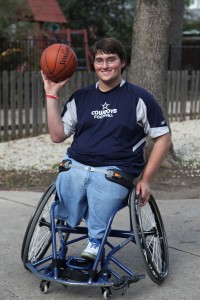
Through Scottish Rite Hospital in Dallas, Hollis gained exposure to disabled sport programs, a particular interest that he had grown to develop. He began with an adventurous glide into mono-skiing, a revolutionized skiing practice that takes a wheelchair adaptation with a ski attached to the bottom and two outriggers (similar to crutches with a ski on the bottom) to help keep balance.
“He was doing the same hills the rest of us were doing and just sitting down,” Mrs. Muenster said. “He was trying to do those jumps that the professional skiers were doing, and from a parent’s perspective it’s kind of hard to watch because you’re like ‘oh my gosh, he is gonna kill himself,’ but then again you can’t keep him back, you have to let him go.”
Off the mountain, Hollis soon found himself with a sport that he could play year-round at home, one that would forever change his perspective on disabilities: wheelchair basketball. An activity he hopes to pursue in college next year.
“My coach on my basketball team has really been a role model for me because he’s pretty much confined to a wheelchair and he’s lived longer, so he has a lot more experience under his belt,” Hollis said. “He’s been on both sides of the ability. He had an injury that rendered him unable to walk, so he has suffered a lot more and learned to live with it and find fulfillment outside of what other people who aren’t disabled can do.”
Along with influences from people such as his basketball coach, Jerry (JT) Terry, faith and family have brought upon contentment to Hollis who admits he has had his darker moments.
“I’ve had points where I’m mad at life, but on a personal level I think there is a religious element to it, like God made me this way, so I’m not just broken,” Hollis said. “On another level, my choices are, sit in the corner and mope to myself or suck it up and learn to live life with a disability. I guess you could say I chose the second.”
Hollis has indeed taken a higher road, one where there are almost no limits to what he is able to accomplish. He rides his bike daily to school, has begun learning how to drive with hand control devices that manage the break and gas and he has even undergone full lifeguard training, passing all the tests required to gain his license, but one: pulling a full sized man up with his spine in an upright position.
“His disability is going to make it seem like he can’t do certain things, because not having most your legs might hold him back, but Hollis is willing to run around and play football with us and he is willing to go do all this crazy stuff that me and my other friends do,” junior Connor Benecke-Totzke said. “I believe it is a personal strength that doesn’t allow him to hold back.”
This experience has given his family, especially his mother, and many others new insight and appreciation for the simpler things in life.
“I’ve dropped all expectations of life; you never know what is going to happen. Every time you have expectations, whether it is something you think your spouse should do, your kid should do, your mother or your sister, you are going to be disappointed because nobody is going to do what you expect in life,” Mrs. Muenster said. “I believe God is in control, certainly is in control of this situation, he has a plan and a design for Hollis just the way he is, and I learned he would have a plan for the next kid I had, boy or girl, legs or no legs.”



